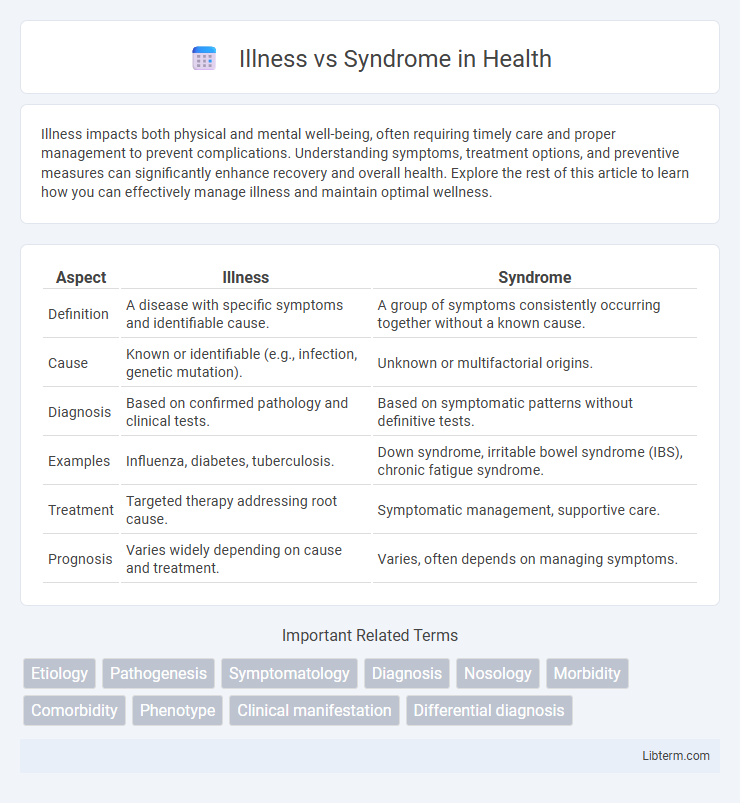Illness impacts both physical and mental well-being, often requiring timely care and proper management to prevent complications. Understanding symptoms, treatment options, and preventive measures can significantly enhance recovery and overall health. Explore the rest of this article to learn how you can effectively manage illness and maintain optimal wellness.
Table of Comparison
| Aspect | Illness | Syndrome |
|---|---|---|
| Definition | A disease with specific symptoms and identifiable cause. | A group of symptoms consistently occurring together without a known cause. |
| Cause | Known or identifiable (e.g., infection, genetic mutation). | Unknown or multifactorial origins. |
| Diagnosis | Based on confirmed pathology and clinical tests. | Based on symptomatic patterns without definitive tests. |
| Examples | Influenza, diabetes, tuberculosis. | Down syndrome, irritable bowel syndrome (IBS), chronic fatigue syndrome. |
| Treatment | Targeted therapy addressing root cause. | Symptomatic management, supportive care. |
| Prognosis | Varies widely depending on cause and treatment. | Varies, often depends on managing symptoms. |
Defining Illness: Understanding the Basics
Illness refers to a specific disease or medical condition characterized by distinct symptoms and abnormal bodily functions, often caused by an identifiable pathogen or physiological dysfunction. It represents a tangible health issue that can be diagnosed and treated through medical intervention. Understanding illness involves recognizing its clinical manifestations, underlying causes, and impact on a person's overall well-being.
What Is a Syndrome? Key Characteristics
A syndrome is a collection of symptoms and signs that consistently occur together, indicating a particular abnormality or condition without a specific single cause. Key characteristics of a syndrome include a recognizable pattern of clinical features by healthcare professionals and the presence of multiple symptoms that may affect various bodily systems. Unlike an illness, which often has a clear etiology, a syndrome describes a group of concurrent medical issues that require further investigation to diagnose the underlying cause.
Differences Between Illness and Syndrome
Illness refers to a specific condition characterized by distinct symptoms and underlying causes, often diagnosed through medical testing. Syndrome encompasses a collection of symptoms and signs that occur together but may not have a clearly identified cause or disease. The primary difference lies in illness being a defined disease entity, while a syndrome represents a pattern of symptoms without a singular confirmed diagnosis.
Causes and Risk Factors: Illness vs. Syndrome
Illness typically results from a specific pathological cause such as infection, genetic mutation, or injury, with identifiable risk factors including lifestyle, environmental exposure, and hereditary predisposition. Syndrome refers to a collection of symptoms and signs without a single identifiable cause, often linked to multiple possible factors like genetic anomalies, developmental issues, or unknown origins. Understanding the differing causes and risk factors is essential for accurate diagnosis and targeted treatment strategies.
Diagnosis: How Illnesses and Syndromes Are Identified
Illnesses are identified through specific diagnostic criteria, often supported by laboratory tests, imaging, or clinical examination targeting a known cause or pathology. Syndromes, however, are diagnosed based on a consistent set of symptoms or signs without a singular identifiable cause, relying heavily on clinical pattern recognition. Accurate diagnosis of illnesses enables targeted treatment, whereas syndrome diagnosis often requires managing multiple symptoms simultaneously.
Symptoms: Comparing Illnesses and Syndromes
Illnesses manifest through specific symptoms directly linked to an underlying pathological cause, enabling targeted diagnosis and treatment. Syndromes encompass a group of symptoms that consistently occur together but may lack a single identifiable cause, making diagnosis more complex. Symptom patterns in illnesses tend to be well-defined, whereas syndromes require comprehensive evaluation to understand the interplay of diverse clinical features.
Treatment Approaches: Illness vs. Syndrome
Treatment approaches for illness typically target a specific cause or pathogen, employing medications, therapies, or surgeries designed to eradicate or manage the underlying disease. In contrast, syndrome treatment often requires a multidisciplinary approach addressing multiple symptoms and underlying conditions simultaneously, as syndromes represent a collection of signs without a single identifiable cause. Tailored interventions focusing on symptom management and improving quality of life are essential in syndrome care due to their complex, multifactorial nature.
Prognosis and Complications
Illness typically presents with a defined prognosis based on the underlying disease, allowing for targeted treatment strategies and more predictable outcomes. Syndromes, characterized by a set of symptoms without a single identifiable cause, often have variable prognoses due to their heterogeneous nature and potential for multiple complications. Complications in illnesses tend to be linked to disease progression, whereas syndromes may lead to complex clinical challenges because of their multisystem involvement and diagnostic uncertainty.
Common Misconceptions
Illness and syndrome are often confused, but they differ significantly; illness refers to a specific pathological condition with identifiable causes and symptoms, while a syndrome represents a collection of symptoms that occur together without a definitive cause. Common misconceptions include treating syndromes as diseases and assuming all illnesses have clear diagnostic markers. Clarifying these differences is crucial for accurate diagnosis and appropriate medical treatment.
Importance in Medical Practice
Understanding the distinction between illness and syndrome is crucial in medical practice for accurate diagnosis and effective treatment planning. Illness refers to the subjective experience of symptoms affecting a patient's well-being, whereas a syndrome encompasses a group of objective signs and symptoms consistently occurring together, indicating a specific medical condition. Recognizing syndromes enables clinicians to identify underlying pathologies and implement targeted interventions, improving patient outcomes and advancing diagnostic precision.
Illness Infographic

 libterm.com
libterm.com